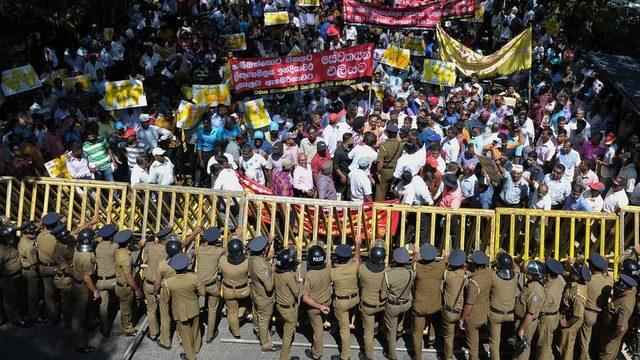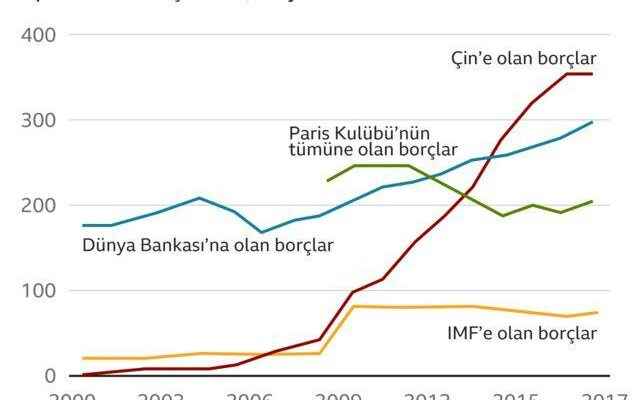Sri Lanka is facing its worst economic crisis since 1948 when it gained independence from Britain. The country defaulted for the first time in its history in May. Sri Lanka’s negotiations with the International Monetary Fund (IMF), which became unable to pay its $51 billion debt, were inconclusive.
IMF announced that the talks will continue; however, a loan agreement has not yet been signed with the country that was dragged into the debt crisis.
Sri Lankan Prime Minister Ranil Wickremesinghe said last week that the country’s economy has completely collapsed and international support is urgently needed.
The debts of Sri Lanka, whose biggest creditor is China, to India are also increasing.
Sri Lankan economy; The Covid pandemic entered a crisis after Russia’s invasion of Ukraine, rising energy prices and populist tax cuts.
No foreign currency reserves
Due to the increasing inflation in the country, which has no foreign exchange reserves, medicines, fuel and other basic consumer goods cannot be found.
In the capital Colombo, the most common means of transportation in the city, tricycle and other vehicles formed long queues in front of gas stations.
In Sri Lanka, with a population of 22 million, people have great difficulty in accessing basic needs, from fuel to food.
India sent 40,000 tons of diesel fuel to Sri Lanka in the spring. The Sri Lankan government requested a loan of 500 million dollars from the Export Credit Bank of India (Eximbank). India had previously given Sri Lanka $500 million in export credits and $200 million in loans.
In Sri Lanka, massive hikes were made in gasoline and diesel prices.
Annual inflation in Sri Lanka was about 34 percent in April, according to official data. But experts say real inflation is 122 percent.
In the first six months of the year, oil prices increased by 137 percent and diesel prices increased by 230 percent in the country.
Government Spokesperson Bandula Gunawardana announced that they have appointed new advisors to negotiate debt restructuring in the spring. For this purpose, it was agreed with France-based Lazard and international law firm Clifford Chance.
However, there was no finance minister in the country to conduct emergency rescue package negotiations with the IMF during this period.
According to the Sri Lankan press, the country had agreed to borrow about $1 billion with India at the end of March.
It is among the news in the press that the country still wants an additional loan of up to 2.5 billion dollars from China, from which it received a loan of $ 2.8 billion during the pandemic period.
In return, China and India are said to have put forward conditions that prioritize their own security interests and enable Sri Lanka to have a say in its strategic sectors.
However, India also accuses China of trapping Sri Lanka in debt traps.
Its debts to China accounted for 10% of Sri Lanka’s $35 billion foreign debt as of April 2021. However, it is stated that the total debt to China may be much higher than this number when public institutions and central bank debts are included.
Sri Lanka wants China to restructure its debts, whereas China seems distant to this offer, in case a similar situation is repeated in other countries where it has creditors.
Sri Lanka is a recurring example of the “debt trap” argument by critics of China. However, studies say there are no examples to support the validity of the “debt trap” narrative.
The allegation that China lends to other countries and seizes key assets when countries are unable to repay their debts is an accusation that has long been denied by Beijing.

However, compared to Western lenders, there is a rapid increase in Chinese loans to countries around the world.
Which countries are next?
According to a new report released by the US-based investment bank JP Morgan, the debt crisis triggered by the war as a result of Russia’s invasion of Ukraine could affect the Maldives, Bahamas, Belize, Senagal, Rwanda, Rwanda, Grenada and Ethiopia after Sri Lanka. .
According to the report, these countries, which are highly dependent on foreign sources for food and energy imports, are at risk of depleting their reserves by the end of 2023.
Within the scope of the fight against inflation, the tendency of interest rates to increase around the world increases borrowing costs.
Protests have been held in Sri Lanka for months against President Gotabaya Rajapaksa and his family members in the administration.
Those looking for a way out of the crisis are trying to flee the country illegally.
